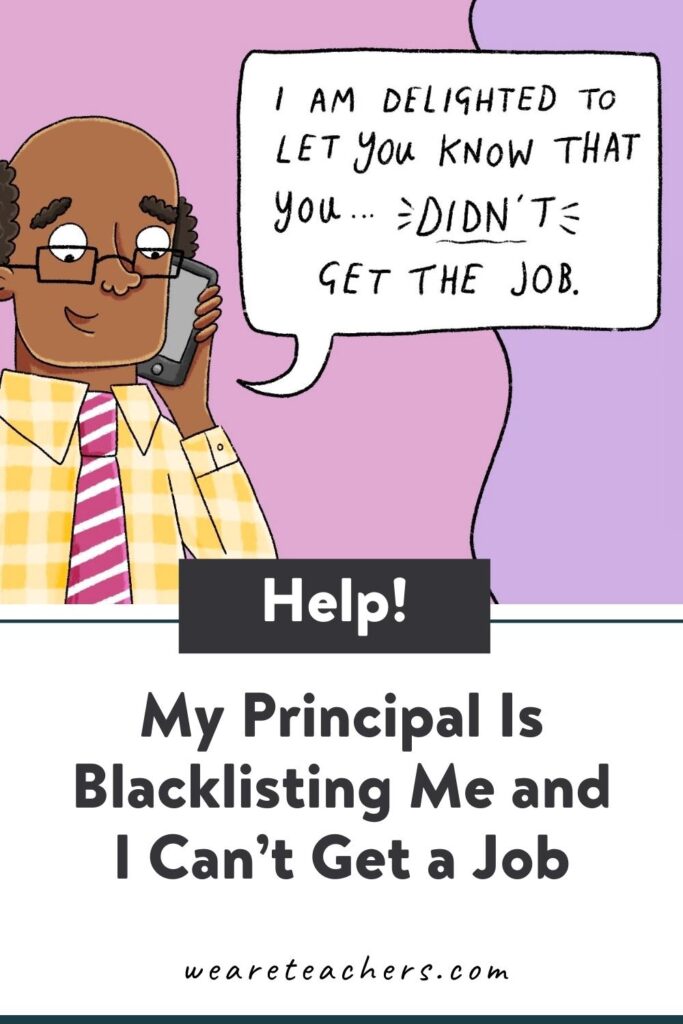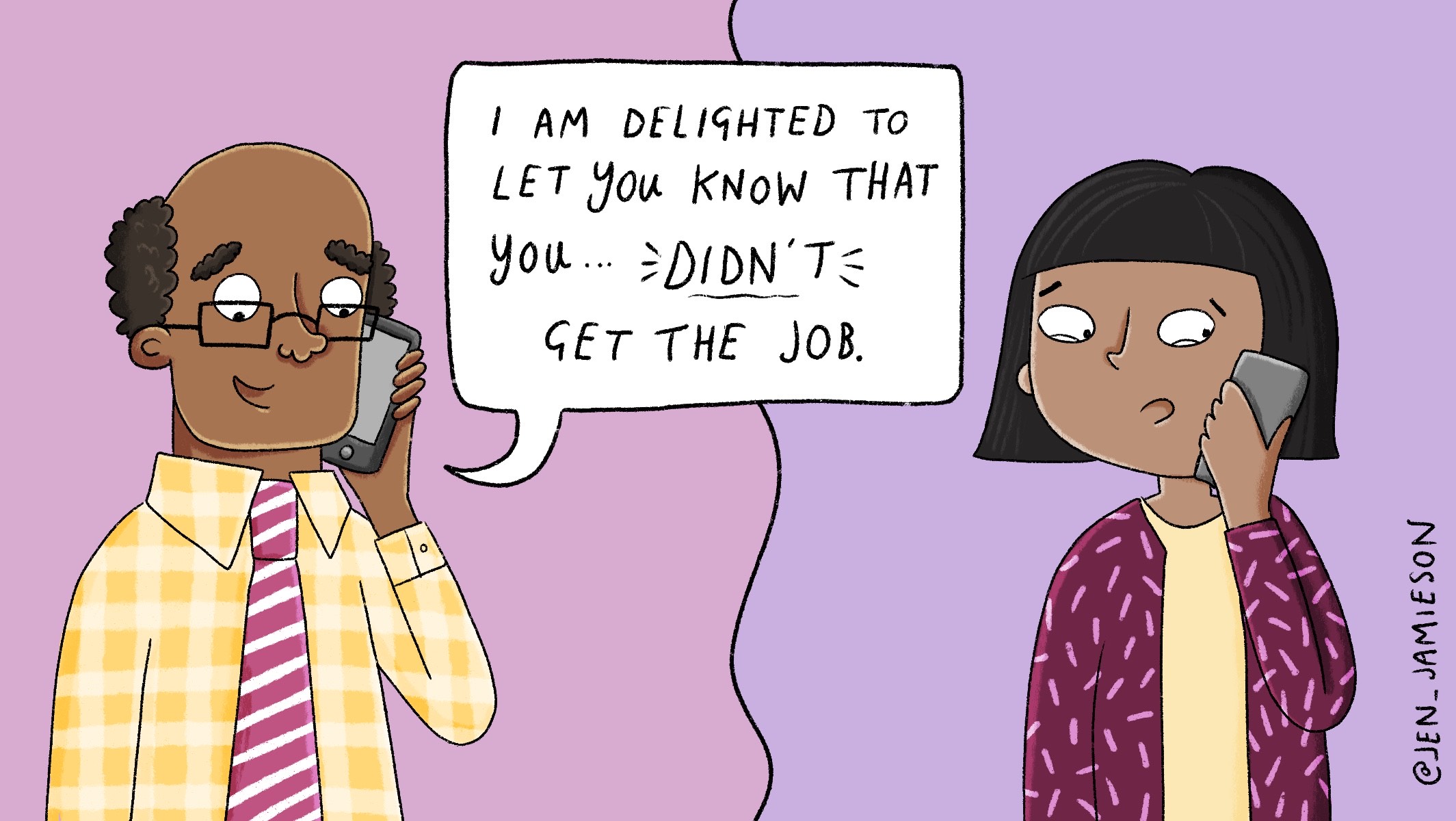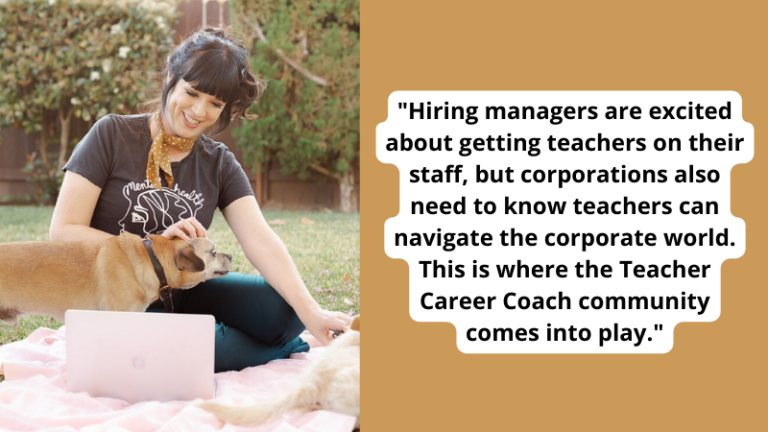Dear WeAreTeachers,
I have been interviewing for new schools since late April. I have a pretty stellar teaching record: no write-ups, multiple teaching and faculty awards, and several leadership positions. No matter how enthusiastic my interviewers have been, I’ve had no luck. After my last interview, where I was pretty much offered the job on the spot, the interviewer told me she ended up rejecting me because my principal was “very clear that she could not recommend me for the position.” What am I supposed to do about this? —Richmond Reject
Dear R.R.
I’ve never understood this. If I were a principal, I would never try to keep a teacher at my school who clearly didn’t want to be there, no matter how talented they were.
A few things:
- Check the rules in your state. Some states prohibit a principal from saying anything other than verifying the dates you worked there. In others, it’s perfectly legal for a principal to say whether or not they would recommend a teacher for a position (or rehire them at your current school). My guess is your principal is within her rights to say this.
- Keep in mind that principals within a district (and sometimes even across districts) are a pretty tight-knit bunch. This might seem like it could only work against you, but it could also work in your favor. There could be someone in your group who understands exactly why you might have wanted to stop working for your current principal. Know what I mean?
- Consider putting an AP or department chair as your reference. Clarify why they’re a good contact to speak to your teaching abilities.
- Honesty might be the best policy. You can also say, “Just so you know, my principal will likely not give me a strong recommendation. However, I have attached an extensive list of contacts from my school and outside of it who can speak to my teaching, character, and leadership.”
- Have a solid backup plan. Think about what you’ll do if you don’t end up getting an offer from another school. Maybe check out this career coach especially for teachers. Having a safety net will make you feel less anxious about rejections. It’ll also keep you from saying yes to an icky school out of desperation.
Even though a lot of things can be solved by having a direct and professional conversation, I don’t recommend asking your principal what’s going on here. If she is already telling other principals she can’t recommend you based on past experience, I don’t see a conversation changing that.
Best of luck to you!
Dear WeAreTeachers,
I’ve been teaching 6th and 7th grade math and science for 12 years now. Every year, I get the same song and dance from parents wanting their kid to skip 6th grade math. They tell me their kid passed the end-of-course exam online. I explain the exam is a poor assessment of the fundamentals needed for success in later math classes. They push back. I tell them horror stories of all the kids who skip 6th grade math and have to transfer back halfway through the year because they’re failing. Some concede at this point and some don’t. I’ve begun dreading the beginning of the year for having to deal with these parents—how do I get them to trust my authority so we don’t have to do this every year? —Back Off Man, I’m a Scientist
Dear B.O.M.I.A.S.,
Parents shouldn’t be looking to you as the gateway/roadblock to skipping 6th grade math, period. A couple of things need to happen here.
- First, seek to understand why parents are so desperate to have their child skip 6th grade math. What perceived advantages does it offer? What risks are they missing or not understanding?
- Meet with your principal and/or district departmental rep for math to determine a crystal-clear procedure for how accelerations are handled. Can parents simply opt their students out of 6th grade math? What assessments and scores qualify for acceleration? Can students take the exam on their own or at school?
- Draft up an agreement page for parents to acknowledge the risks of this decision.
- All of this needs to be communicated to the parents of 5th graders in March of their 5th grade year. Your principal/district math rep need to be the ones making sure this happens, not you.
Once this is done, when you get emails about this (either from parents who forgot or transfers from out-of-district), you can copy and paste this response:
“Thanks so much for your questions. I’ve attached our district policy for accelerating students in 6th grade math as well as a parental acknowledgment form. You can contact [principal] or [district math rep] if you have any further questions.”
Dear WeAreTeachers,
I have a problem that I know is immature, but I can’t help it. I have a really hard time when people who do way lower-quality work than me get the same or better recognition as me. It seems at every school, I watch the people who cut corners, behave unprofessionally, come in late, etc., rise to the top. It’s a recurring pattern in many areas of my life, but I struggle with it the most professionally. Can you help me not care so much about this? —Cannot Let It Go
Dear C.L.I.G.,
You know that old story about the prodigal son? It’s about a younger son who goes off gallivanting in Las Vegas, lighting his inheritance on fire, while the older son and father toil away at their Des Moines bakery together, working 12 hour days to make ends meet. Decades later, the younger son runs out of money and comes back to rejoin the family at the bakery, and what does the father do? Throws a four-day rager in celebration.
(I may be fuzzy on the details.)
Anyway, I think it’s totally normal as the “older brother” in your story to be hurt when people get out their confetti for corner-cutters when you’re burning the candle at both ends with dad. I know I’ve felt that way sometimes. I also know there are plenty of times I’ve been the younger brother and have been celebrated or given kudos when other people (often the quieter, behind-the-scenes types) are more deserving than me.
If it were just one school, I might chalk it up to leadership playing favorites or a cliquey school culture. But because you mention this happens in lots of other areas in your life, I think it might be worth unpacking with a therapist. They can help you determine if there’s something else contributing to these feelings and patterns. They can also help you navigate some important conversations, like:
- whether this environment is toxic or not
- the tricky task of remembering and returning to your worth
- the even trickier task of learning to hold space for celebration for others at the same time as experiencing sadness for yourself
Hugs to you on this journey.
Do you have a burning question? Email us at askweareteachers@weareteachers.com.
Dear WeAreTeachers,
I love a lot of things about my principal. She’s wonderful to our faculty and staff, fabulous with our kids, and always supportive of us … as long as it’s just us. Once that conflict crosses over to involve parents or community members, she instantly caves. Last week we went into a parent meeting agreeing that the parent’s complaint about my end-of-year celebration was baseless, but as soon as she mentioned her relationship with a board member, my principal switched gears and pretended I was in the wrong. I want to talk to her about this, but it doesn’t feel like my place to critique her leadership decisions. What do you recommend? —Vulnerable in Virginia


